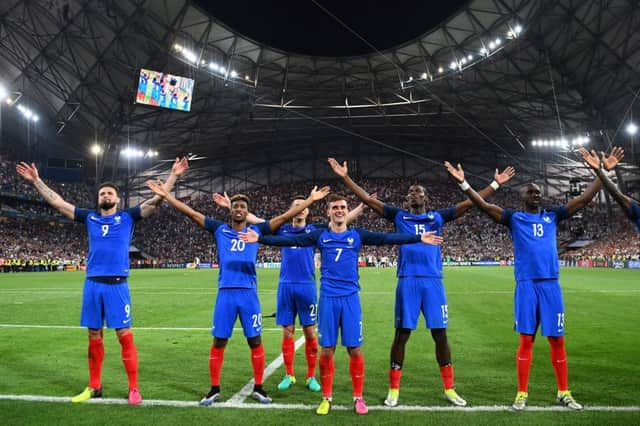Jonathan Wilson: Didier Deschamps' Euro 2016 final dilemma


At the moment, he appears a lucky general rather than a good one, albeit one who, despite some tactical issues, has fostered a ferocious team spirit, the capacity to find goals late in games and to handle demands of the public. “I don’t know about pressure, there has been a lot of expectation over the last two years,” Deschamps said. “The opening match was like a final, even though it wasn’t a final – this is a real final.”
The opposition in those first five games, though, was never of the calibre to offer much satisfaction in victory. Only in the semi-final against Germany was there a real sense of occasion. France’s victory in Marseille was magnificent, a great game won through a combination of good defending, good fortune and the alertness of Antoine Griezmann. That night, at last, gave France a memory to hand down to future generations. Finish the job off with an impressive win over Portugal and Euro 2016 will be recalled as a great success for France and Deschamps, not as viscerally thrilling as 1984 perhaps, but a memorable achievement nonetheless. Yet the truth is that in all but one of the six games so far, France have been struggling at half-time.
Advertisement
Hide AdAdvertisement
Hide AdThere are two ways of looking at that. You can criticise Deschamps for having repeatedly got his set up wrong or you can praise for him for putting things right. Against Germany, France were extremely fortunate – from a tactical point of view at least. After the initial emotional surge, Germany took control of the centre of midfield and dominated the rest of the first half until conceding that penalty in injury-time. Only when N’Golo Kante came on with 20 minutes to go were France able to put up a fight in that area – a more incisive Germany, a Germany with a proper centre-forward, would surely have taken advantage.
That’s the big decision Deschamps must take before the final. Does he stick with the 4-2-3-1, which has the advantage of getting Griezmann close to Olivier Giroud so he can take advantage of his knockdowns and risk being overrun in midfield, or does he bring in Kante, shift to a 4-3-3 and fight it out in midfield – the danger being that an attritional game is just what Portugal want and, if it comes to requiring somebody to create something from nothing, Cristiano Ronaldo is the man most likely to do that.
The Portugal coach Fernando Santos has pulled off a remarkable feat.
He has taken a one-man team and made it hardly about the one man at all. If Portugal beat France at the Stade de France tonight and win their first international trophy, it will of course be about Ronaldo – not least because he will make sure it is – but more than that it will be about the unit Santos has constructed behind him, the dour solid block of eight outfielders that has conceded a single goal in 300 minutes of knockout football.
Portugal in the group stage were more open, more attractive than they have become but leaking three against Hungary has turned them away form that path. There is talk Danilo Pereira could retain his place at the back of midfield ahead of William Carvalho, who is available again after suspension, but whoever the anchor is, he will be surrounded by three aggressive, disciplined and young – all of Portugal’s midfield is 24 or under – players.
It’s a particular effective strategy because Ronaldo is so dangerous.
Santos has looked at Portugal’s two biggest problems – accommodating Ronaldo and the lack of a proper centre-forward – and found one solution. And the fact is that Ronaldo, powerful, explosive and still sublimely skilful, is the ideal lone forward. He has always been a man apart, independent from at times even resentful of his peers: freeing him tactical instruction beyond getting the ball and doing something with it has the genius if simplicity.
Yet Ronaldo is not the player he was. In this tournament Ronaldo has had 44 shots, completed just three dribbles and won 12 of the 33 aerial duels he’s been involved in. Two of his three goals have come from thumping headers. He is not the willowy dribbler of 12 years ago when he wept on the pitch after Portugal had lost to Greece in the final of Euro 2004 and vowed to win the tournament at some point in the future, and he is certainly not the brilliant all-rounder of five or so years ago. He has become an odd hybrid, all bullocking runs from an inside-right position and the old-school neck muscles of a classic No.9. The irony is that it’s taken Portugal to stop being all about Ronaldo to bring him this close to international silverware again.
Advertisement
Hide AdAdvertisement
Hide Ad“If there is an anti-Ronaldo plan, no-one has yet found the recipe,”
Deschamps said. “He’s a very top player, he’s got great athletic attributes in the air. It’s not just that he can get up high but he can hang there was well. His six-pack is there for a reason, but he has the two things that are very tough to combat in football – pace and the aerial threat. It would be great to neutralise him and we need to also limit his influence.”
But France must also puncture that Portuguese midfield. Twelve years on from his tears in Lisbon, Ronaldo finds himself on the other side of the fence, the spearhead of a hard-working well-organised side looking to down the hosts in the final. The how is less important than the winning: legacy is for later.